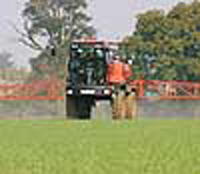Video: Crop Watch – Shrinking window for Atlantis

A narrowing weather window means some growers might have to delay planned Atlantis sprays until spring, according to our Crop Watch agronomists.
Dan Dines, a Wessex Agronomy Services agronomist from Wiltshire, said he was making a concerted effort to ensure Atlantis (mesosulfuron + iodosulfuron) was applied in the autumn. “But conditions need to be spot on and the weather has now deteriorated.”
Pre-emergence herbicides had been effective in cereals, but the level of crop scorch had been higher than previous seasons, he said. “Excessive rainfall shortly after application, capped soils and the high loading of chemicals are responsible.”
In Yorkshire, Arable Alliance agronomist David Martindale said a large proportion of earlier-drilled wheat crops had been treated with Atlantis when the weed had one to two leaves. “The dilemma for recently emerged wheat is whether Atlantis will be applied pre-Christmas or in spring.”
But good pre-emergence herbicide efficacy and mild weather for most Atlantis applications meant blackgrass control should be relatively high this autumn, he said.
In Lincolnshire, propyzamide and carbetamide applications should soon be under way, said Farmacy agronomist Philip Vickers. “But this will depend on soil temperature, which needs to be 8C or lower at 10cm depth. There also needs to be enough soil moisture to allow these chemicals to work, but at the same time to avoid the risk of leaching.”
About 10% of his wheat area was scheduled for an autumn Atlantis application, which he expected this to rise, but weather might get in the way, he said.
Barley was being treated with chlorotoluron, if the variety allowed, combined with an insecticide. Crops on lighter land were also being treated with manganese, he said.
Slugs were still causing concern in less-developed oilseed rape crops, particularly those established relatively late with a sub-soiler, he added.
Agrovista agronomist Swaran Bachoo from Hampshire said residual herbicides applied at pre-emergence appeared to be working well. But, where blackgrass had come through the first treatment, applying Atlantis was the only option before it got beyond the three-leaf stage, he said.
Oilseed rape crops were at the 4-6-leaf stage and crops sprayed for phoma around the middle of October with flusilazole or prothioconazole were disease-free, he said. “Further monitoring is required with the wet weather around and a second spray is likely to be needed. Also watch for light leaf spot, which is becoming a problem in the south west.”
• Video: David Martindale assesses pre-emergence herbicide efficacy and Atlantis timing in wheat
| SPUD SPECIAL The Scottish potato harvest was almost over with nearly all crops safely in store, said SAC agronomist Mike Inglis. The quantity of soil in some stocks was high, but clear and still autumn air had helped dry the crop and start pulling temperatures down, he said. “The continual use of crop drying – in many cases by positive ventilation – is crucial in ensuring a successful out-turn.” The main problem being removed on the grader was common scab, which was understandable given the dry conditions around tuber initiation, he said. “There are few rots being reported, although the later-lifted stocks may tell a different story.” |
|---|

